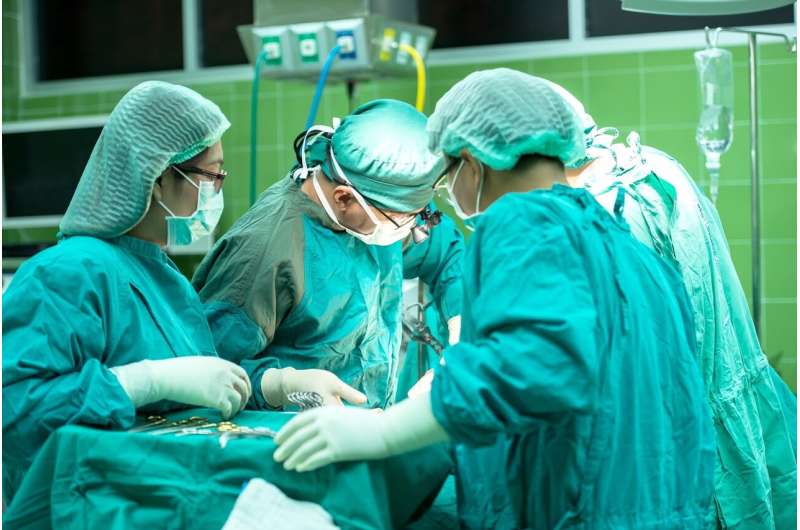Is it safe to have surgery after COVID-19 infection?

It is now clear that the lingering effects of COVID-19 can affect your health in many ways—including how your body reacts to surgery. In this case, the changes are significant. A growing number of studies have shown a substantial increased risk in post-operative death and pulmonary complications for at least six weeks after symptomatic and asymptomatic COVID-19 infection.
No surgery is without risk, and surgeons always weigh the risks versus benefits of performing a specific procedure on a particular patient. These findings about the connection between COVID-19 infection and surgical complications and mortality add new variables to the equation, and hospitals and health systems around the country are adopting new policies to keep patients as safe as possible.
A new policy at Yale New Haven Health now stipulates that elective surgeries for adult patients that require general or neuroaxial (anesthesia placed around the nerves, such as an epidural) anesthesia should be deferred seven weeks from the time of a known COVID-19 diagnosis.
Additionally, elective surgeries for adults who are immuno-compromised, diabetic, or have a history of hospitalization should be deferred eight to 10 weeks after diagnosis. Those with a history of intensive care hospitalization should be deferred 12 weeks.
Surgeons are advised to discuss the risks of proceeding with surgery with a patient ahead of time, says Nita Ahuja, MD, MBA, chair of surgery for Yale Medicine and chief of surgery for Yale New Haven Hospital. These guidelines do not apply to urgent and emergency surgery, she adds.
A snapshot of the studies
Several small studies, including one published in The Lancet, have suggested patients with positive COVID-19 test results may experience worse outcomes and increased chance of dying after surgery. A large international study, published in Anaesthesia, showed that keeping surgery on hold for at least seven weeks after a positive coronavirus test was associated with lower mortality risk compared with no delay.
The most recent study on this topic was published in JAMA Network Open in April and compared 5,470 surgical patients with positive COVID-19 test results (within six weeks) to 5,470 patients with negative results. There were more than double the number of deaths reported in the COVID-19-positive group versus the group with negative results.
An evolving landscape
Though surgeons are well aware of these guidelines, it's important for patients and their family members to understand the reasoning behind a decision to delay a surgery, even for a person who feels perfectly well. "We want to provide this information to patients so they can have a discussion with their surgeons and providers," says Roberta Hines, MD, chair of Yale Medicine's Department of Anesthesiology. "Each decision should be made at the individual level, and we want to stress that the patient is an active participant in their care."
For example, a patient who has cancer that requires surgery may want surgery as quickly as possible. For some, the risks of waiting to have the surgery may be greater than delaying it, while for others it may be smarter to wait. Every situation is different and what to do in a particular case is a decision that should be made jointly by patient and surgeon.
Emergency surgeries to "save life or limb" will still be done as needed. However, says Dr. Ahuja, "Semi-elective surgery accounts for the majority of our cases, especially with cancer care. These are surgeries that don't need to be done tonight, but there is a certain window of time. However, if someone comes to the hospital after a car accident, we won't delay surgery because they had COVID."
All patients must take a PCR (polymerase chain reaction, which is the most reliable of the various types of available tests) COVID-19 test before surgery. That will not change, and is key to picking up active infections [not prior ones] patients never knew they had, Dr. Ahuja adds.
The connection between COVID-19 infection and surgical complications seems logical given how research suggests a link between COVID-19 infection and inflammation. "Plus, an infection creates an inflammatory state in the body, and that can perpetuate for at least six weeks," Dr. Ahuja explains. "So that is why we recommend delaying surgery at least six weeks, so that your body is not still dealing with the effects of the virus."
It's not only the surgical procedure but the anesthesia as well that can exacerbate inflammation in the body, Dr. Hines notes.
"COVID-19 is an emerging disease and we are still learning about its acute and chronic repercussions. We initially thought it was a respiratory disease, but now we have learned about blood clots and a complex inflammatory process," Dr. Hines adds. "Six months from now, we may have different guidelines as the data is evolving."
More information: Max R. Haffner et al, Postoperative In-Hospital Morbidity and Mortality of Patients With COVID-19 Infection Compared With Patients Without COVID-19 Infection, JAMA Network Open (2021). DOI: 10.1001/jamanetworkopen.2021.5697
Timing of surgery following SARS‐CoV‐2 infection: an international prospective cohort study, Anaesthesia (2021). DOI: 10.1111/anae.15458



















